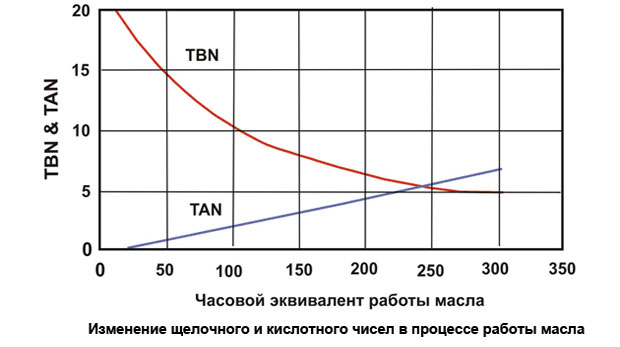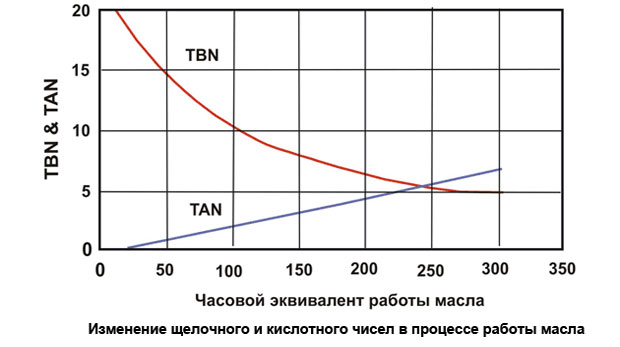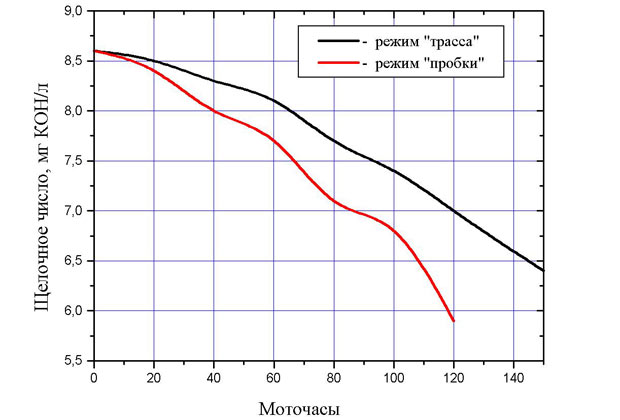
What does the base number of motor oil mean?
Content
The chemical meaning of the base number
The base number of engine oil (abbreviated TBN in English literature) is a value indicating the amount of potassium hydroxides in one gram of engine oil. The unit of measurement is mgKOH/g.
As you know, alkali is a kind of opposite of acids. Most acids, regardless of the chemical elements that form them, are neutralized when interacting with alkalis. That is, they lose their ability to donate a hydrogen cation and are converted into less active chemical compounds.
Potassium hydroxide has one of the strongest acid neutralizing properties. At the same time, the KOH solution has powerful splitting, dissolving and washing properties. This compound, for example, is widely used in the manufacture of industrial detergent compositions. Therefore, for motor oils, when calculating the base number, it is potassium hydroxide that is taken as the base component.


Practical meaning
Engine oil works in difficult conditions. Pressure, high temperatures, fuel penetrating through the rings, hot gases and soot - all this leads to inevitable chemical transformations of both the base and the additive components of the oil.
Under the influence of high temperatures and in the presence of oxygen, engine oil is oxidized. Although the base composition, especially synthetic motor oils, has a high chemical stability, oxides are inevitably formed at high temperatures.
What's wrong with oxides? By and large, the oxidation of engine oil is its burnout. After all, the combustion process itself is, from a chemical point of view, an oxidation reaction with the release of heat. And the products of such a reaction, that is, oxides, for the most part, are a useless ballast of chemically neutral or inactive compounds.


For a brief description of the totality of most of these oxides, there is even a special term - sludge. The products of thermal decomposition of the oil, that is, sludge, settle on the surfaces of the engine, which leads to its contamination. A dirty motor can cause overheating. Also, sludge particles often contain superhard oxides that act as abrasives.
Some of the oxides are chemically active. Some of them are capable of initiating corrosion processes or locally destroying non-metallic parts of the motor (mainly rubber seals).
Potassium hydroxide works in two directions:
- partial neutralization of the resulting acids;
- splitting into the smallest possible fractions of sludge compounds and preventing their formation.
When the engine is running, the base number of the engine oil decreases, which is a normal process.


Estimation of base number of engine oil
The base number is almost always indicated on the oil canister on the back of the label. Currently, this figure varies from 5 (for the simplest and cheapest lubricants) to 14 mgKOH / g.
Other things being equal, more oxides are formed in diesel engines. Firstly, this is due to the composition of the fuel. The sulfur content in diesel fuel is much higher than in gasoline. And sulfur tends to form various oxides when exposed to high temperatures.
Secondly, the operating conditions of the diesel engine are more severe. Higher pressure, higher temperature in the combustion chamber. As a result, the process of burning out the oil is more active.


Therefore, for purely diesel oils, a base number of 9 mgKOH / g and above is considered normal. For gasoline engines, the requirements are somewhat underestimated. For unforced engines running on gasoline, 7-8 mgKOH / g will be sufficient.
However, there are oils in which the base number is lower. This does not mean that the oil is bad, and it is best to avoid using it. It must be understood that the washing properties of such oils will be lower. And this means that closer to the replacement (when the initially low amount of alkali decreases), the process of sludge formation will accelerate. Therefore, oils with a low base number are recommended to be changed more often.
The reverse side of the coin is the fact that with the strengthening of the additive package, the base number also decreases. That is, in theory, especially for inexpensive oils, just the same high base number may indicate a depleted composition of other important additives.


Watch this video on YouTube